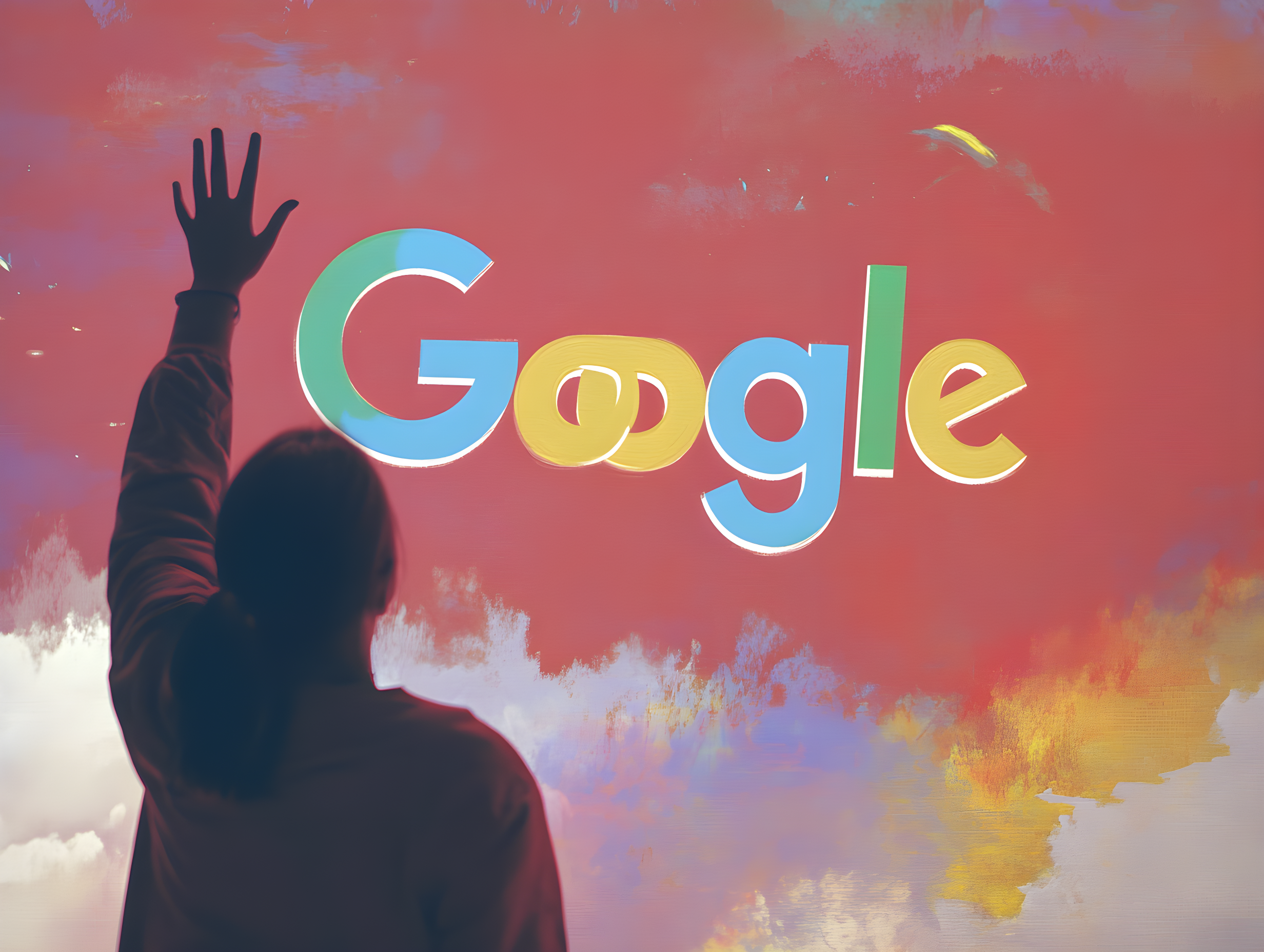 Image source: Generated by AI
Image source: Generated by AI
At 3 a.m. today, Sundar Pichai, CEO of Google and Alphabet, delivered an important speech at the Global AI Summit being held in Paris, France-this is the golden age of AI innovation.
Pichai believes that AI technology is undergoing rapid progress, and the significant drop in costs is particularly significant. In the past 18 months, the cost of processing tokens has dropped by as much as 97%, from $4 per million to 13 cents.
In the field of science, AI has also made major breakthroughs. For example, AlphaFold, a protein model released by Google, has helped more than 2.5 million researchers around the world develop new malaria vaccines and cancer treatments. Google has also made important progress in quantum computing, with its latest Willow quantum chip solving an ultra-difficult problem in less than five minutes that classic computers can solve.
From AlphaGo Zero, which defeated the top human Go masters, to AlphaFold, a protein model, and Transformer, which changed the trend of AI in the world, Google, as one of the global AI leaders, is willing to continue to participate in and lead this golden age of AI innovation.
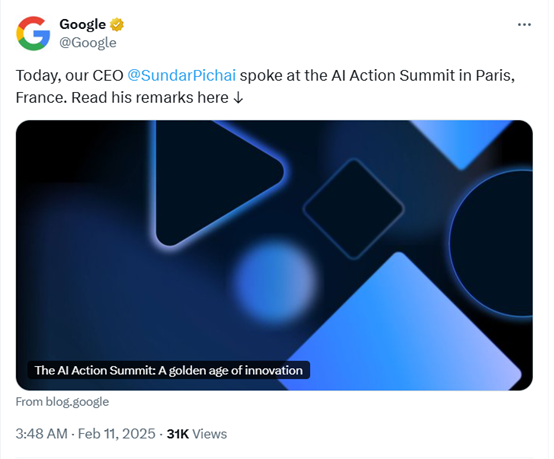
The following is Pichai’s original content:
Dear leaders and guests, I am very happy to be here with you today.
President Macron, thank you for your invitation and for gathering such an outstanding group of people here.
AI is a once-in-a-lifetime technology. Discussions like today’s focus on cooperation and concrete actions will drive this work forward.
Today I want to share some examples that explain why I am so optimistic about AI and its applications, and how we have the opportunity to benefit everyone around the world.
For me, improving my life through technology is a personal matter.
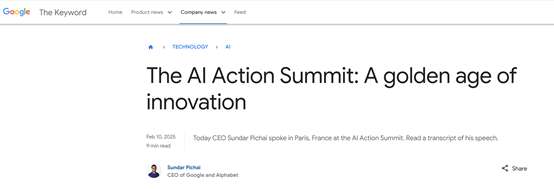
I grew up in Chennai, India. Every new technology takes a long time to enter our lives, including rotary phones. We are on the five-year waiting list. When the phone was finally installed at home, it changed our lives.
In the past, I had to travel back and forth for four hours to help my mother get blood test results. Sometimes when I rush to the hospital, I am told,”I’m not ready yet, come back tomorrow.” Now, we just need to make a phone call to solve it.
I have witnessed the positive impact that technology can have and make life better. This set me on a path, first to the United States, and finally to join Google, a startup that was still growing at the time.
At the time, I couldn’t imagine that one day I would raise a glass to the Nobel Prize won by three Google colleagues in just a few weeks, and would take my parents for a ride in a driverless car. And all this is thanks to another technology: AI.
We are still in the early stages of AI development, but I firmly believe that AI will bring about the most profound changes in our lifetimes.
Its impact is greater than the popularity of personal computers and the rise of the mobile Internet. Moreover, compared with the Internet, it will play a greater role in promoting information popularization.
In the past 18 months, the cost for developers to process a token has dropped 97%. It used to cost $4 to process 1 million tokens, but now it costs just 13 cents, and I expect this trend to continue.
The result: intelligence is more accessible and ubiquitous than ever before.
Therefore, the moment is characterized by platform change. But what makes it so profound? There are several aspects:
As interactions with AI become more intuitive and humane, it puts us at the center of the experience. Technology began to act like a natural extension of our bodies, enhancing human capabilities, bridging gaps in professional knowledge and experience, and breaking down barriers to language and accessibility.
As a truly universal technology, AI is applicable to many human activities and all areas of the economy. Every company, every industry, including the public sector, will apply this technology in its own way.
As AI continues to evolve, it will stimulate innovation, opportunity and growth in the global economy, drive explosive growth in knowledge, learning, creativity and productivity, and shape the future in exciting ways.
The opportunities brought by AI are extremely huge. And everyone here has the responsibility of ensuring that as many people as possible benefit from it.
Why Google invests in AI
The opportunity to improve lives and transform the world is why Google has been investing in AI for more than a decade. Because we believe this is the most important way to advance our mission, which is to organize global information so that it can be accessed and useful by all.
Looking back at the major breakthroughs in the AI field over the past decade, our researchers have played an important role in them. From key language understanding technologies, to AI to defeat the world’s top Go players, to Transformer architecture, it is the foundation of today’s generative AI revolution, powering the most advanced AI models.
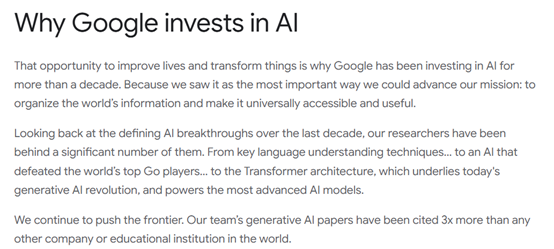
We constantly explore the forefront. Our team’s papers on generative AI are cited three times as many times as any other company or educational institution in the world.
Promoting development in this area means building infrastructure. This includes our network, which consists of more than 2 million miles of land and undersea optical cables. We also have chips dedicated to AI, namely tensor processing units, which have currently developed into the sixth generation. In the past two generations alone, we have tripled its carbon efficiency.
This infrastructure has helped develop cutting-edge models like Gemini, which have made breakthroughs in processing multimodal information such as text, images, video, audio and code, while also having long text processing and agent capabilities.
Our infrastructure also allows us to make these cutting-edge technologies available to developers, entrepreneurs, businesses and more.
Finally, we are developing applications that allow AI to truly help people around the world. We now have seven products with more than 2 billion users, such as Google Maps, Google Search and Android. They all benefit from our AI innovations and the latest Gemini model.
All of these together constitute our unique full-stack innovation model and bring a new experience.
How AI brings new experiences
I am very excited about some of the experiences AI brings, including in-depth research and the ability to think. They help people conduct in-depth research on specific topics, like having a personal research assistant that can search information on the Internet, analyze data, and summarize key findings.
I know many of you are thinking about summer plans.
You can ask an in-depth research agent: “Where should I go to Europe for two weeks in August?” In five minutes, you’ll get a comprehensive analysis that takes into account factors such as costs, weather, visa requirements, and all information is cited from the source. Moreover, the speed of obtaining information continues to accelerate.
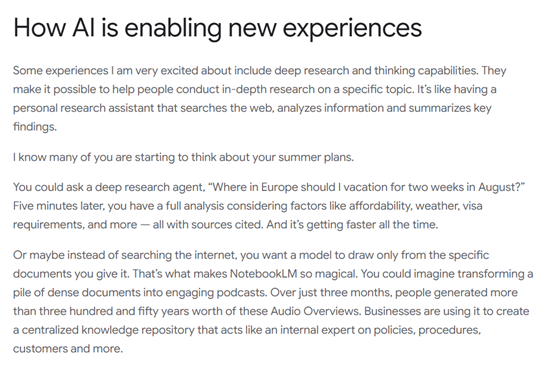
Or, instead of searching on the Internet, you want the model to extract information only from the specific documents you provide, which is the magic of NotebookLM. You can imagine turning a collection of obscure documents into a fascinating podcast. In just three months, people used it to generate more than 350 years of audio summaries. Companies are using it to create a centralized knowledge base that acts like an in-house expert who can answer questions about policies, processes, customers and more.
As models become more multi-modal, so do their understanding of the world around them. All you need to do is point your phone’s camera at the objects around you and ask Project Astra questions.
What’s really exciting is that Project Astra brings us one step closer to our vision of building a universal AI assistant that can seamlessly integrate into our lives across different devices and scenarios. We will soon be applying similar features to our products.
How AI can help scientific discovery
These are some examples of how people and businesses are using AI today.
But in the field of science and exploration, some of the results brought by AI are the most exciting.
A powerful example is AlphaFold, which made a major breakthrough in predicting the complex structure of proteins. The Nobel Prize celebration I mentioned before is a direct reflection of the research results of Demis and John of Google’s DeepMind company. Demis, or Sir Demis should I call him, is also here today, and let us applaud him.
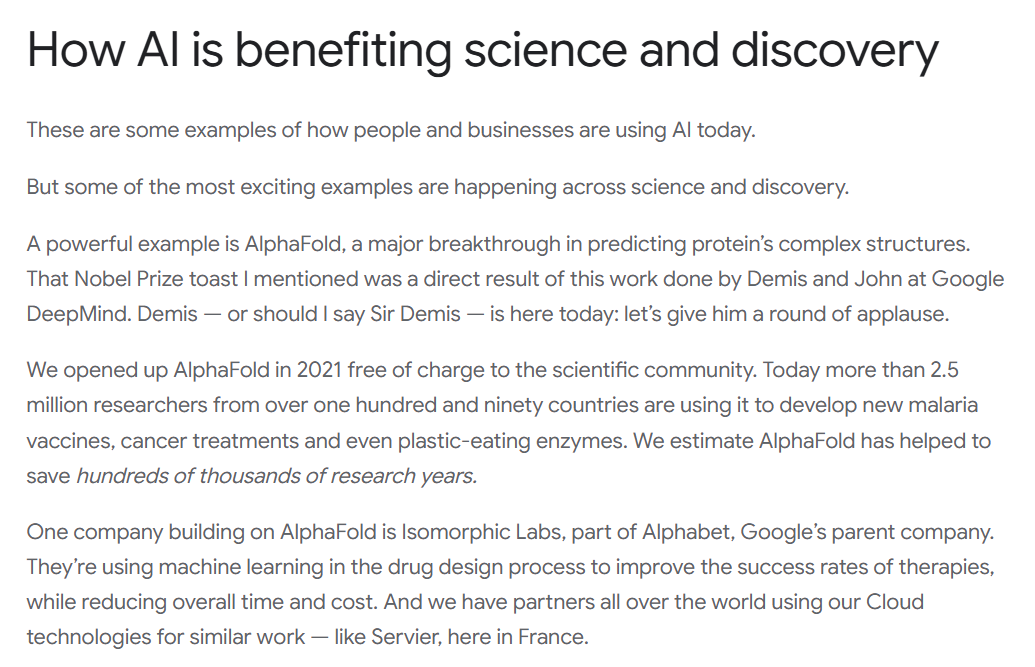
In 2021, we will open AlphaFold to the scientific community for free. Today, more than 2.5 million researchers from more than 190 countries are using it to develop new malaria vaccines, cancer treatments, and even enzymes that break down plastic. We estimate that AlphaFold saved hundreds of thousands of research time.
Isomomorphic Labs is a company owned by Google’s parent company Alphabet. Based on the results of AlphaFold, it uses machine learning technology in the drug design process to improve the success rate of treatment options, while shortening research and development time and reducing costs. Moreover, we have many partners around the world who use our cloud technology to do similar work, such as Servier in France.
Quantum computing will also help scientists discover new drugs, design more efficient batteries for electric vehicles, and accelerate research in the fields of nuclear fusion and new energy.
This is the next major paradigm shift in computing after AI. We have also made good progress in this regard.
In December last year, we achieved the latest breakthrough. Our state-of-the-art Willow quantum chip completed a computing task in less than five minutes, while traditional computers took 10 to the 25th power of years to complete the task (that is, a 1 followed by 25 zeroes, which is a time longer than the existence of the universe).
Moreover, even if the number of quantum chips increases, their calculation errors will decrease. By the way, AI also plays a role. We will continue to make progress on the road to fully error-correcting quantum computers.
Now, let me give you an example that has become a reality: fully autonomous cars.
After years of technology development and promotion, the recent progress made by autonomous vehicles is amazing.
In 2024, Waymo will operate in four cities and carry passengers on more than 4 million trips.
One recent trip took my parents and I to a park near the Golden Gate Bridge in San Francisco.
Obviously, I’ve ridden in Waymo’s self-driving car before, but looking at my father, who is in his 80s, I have a whole new understanding of the advancement of this technology.
How AI benefits society
There are many examples of AI benefiting society. One example is expanding information acquisition channels through language.
When Google Translate was first launched, its model relied on language data widely available on the Internet. But this is not the case for most languages in the world, especially in places such as Africa.
Last year, we used AI technology to add more than 110 new languages to Google Translate, and 500 million people around the world use these languages. This brings the total number of languages we support to 249, including 60 African languages. There will be more in the future.
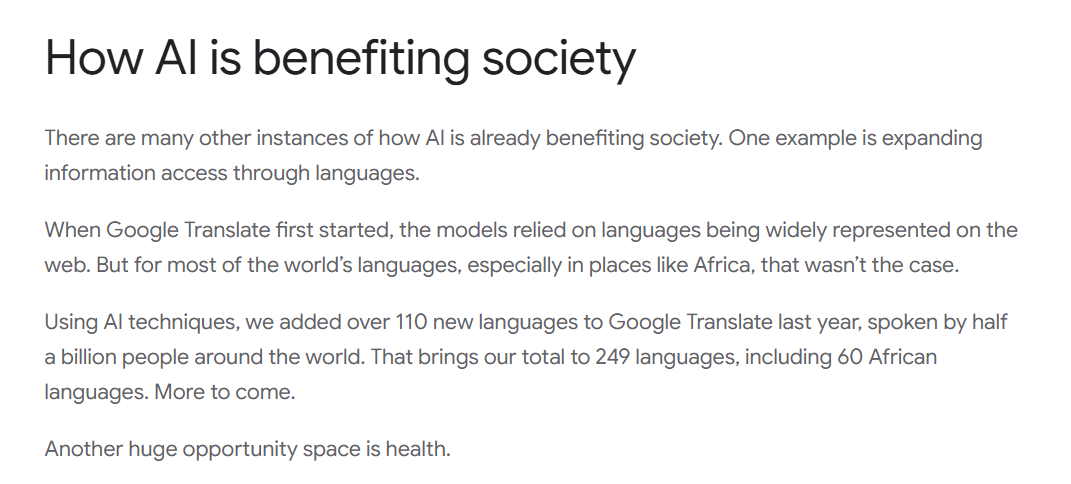
Another area full of huge opportunities is medical and health.
In Paris, we are excited to partner with the Institut Curie to combine their world-class research with our cutting-edge AI technology. Our goal is to improve treatment outcomes for women with multiple rare and fatal cancers, including identifying predictive biomarkers for certain uterine cancers and more accurately predicting breast cancer patients ‘response to specific treatment options. It is a great honor for us to cooperate with the Curie Institute.
In India and Thailand, we worked with local organizations to conduct 6 million AI screenings for diabetic retinopathy, a preventable cause of blindness, and were free to patients.
In addition to health care, AI is also improving the way communities respond to natural disasters.
Our AI-based FloodHub flood prediction system currently covers more than 100 countries and more than 700 million people, and even in areas where data is scarce, it can provide local communities with 7 days ‘advance warnings.
We also use AI to map the boundaries of large wildfires in 27 countries around the world to provide accurate information to people. The service has reached 30 million people in the past year and helped people evacuate safely when wildfires broke out in Los Angeles last month.
Our new satellite technology FireSat will give us even more powerful tools. It uses advanced sensors and high-resolution images to detect fire sources as small as 5×5 meters. This will bring huge changes to the work of firefighters.
From all these examples, I hope you can see the huge potential of AI to benefit mankind, promote economic development, advance scientific progress, and address major challenges to mankind.
But these beneficial results do not come naturally or inevitably occur.
This requires all of us to work together in multiple aspects.
Ways to unleash the potential of AI
Let me explain in detail what to do.
First, we must create an ecosystem of innovators and applicators.
I mentioned before about France’s growing innovation ecosystem. How can we build such innovation centers in more places?
As Mario Draghi pointed out in his recent report, Europe’s productivity depends on the application of these emerging technologies, and Europe’s competitiveness depends on productivity. Therefore, promoting the application of technology is the key, so that productivity can be increased on a large scale across the economy.
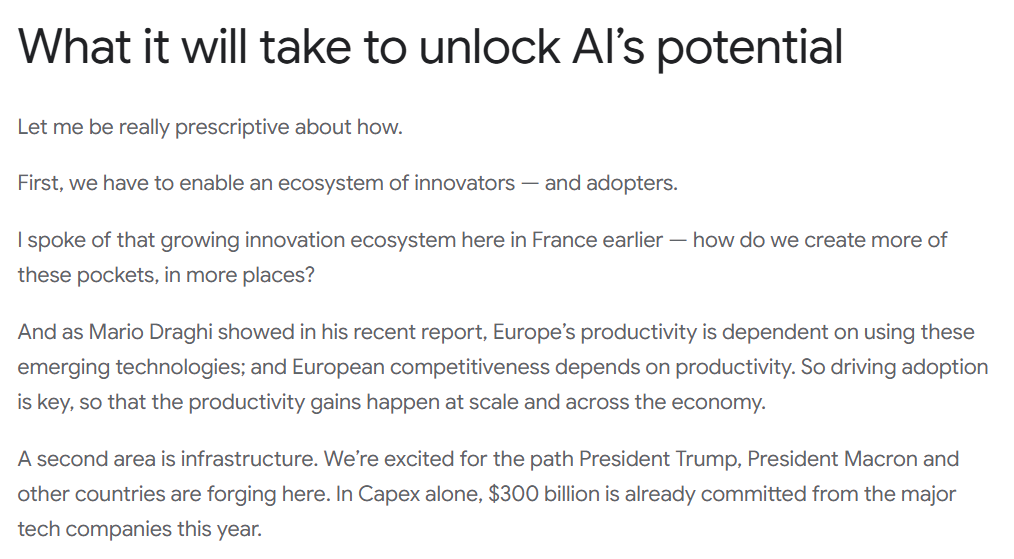
The second is infrastructure. We are heartened by the path President Trump, President Macron and other countries have opened in this regard. This year alone, major technology companies have committed to spending $300 billion in capital expenditures.
Last week we announced that we expected capital expenditures to be approximately $75 billion in 2025.
Third, we must invest in talent to help people prepare for the future of the workplace.
I saw a report from this year’s World Economic Forum that estimated that most jobs in Europe will soon be upgraded with generative AI, and 7% of jobs will face automation. A report from the International Labor Organization (ILO) shows that the boosting effect of AI will be six times that of possible substitution.
We want to help the future workforce adapt to these realities.
In the past decade, the Google Growth Plan has helped 100 million people around the world improve their digital skills. Now, we have established a $120 million Global AI Opportunities Fund dedicated to providing AI education and training in communities around the world. We will reach 20,000 people in 24 European countries.
Fourth, we must act boldly to advance the most transformative applications of AI, while ensuring that they are done in a responsible manner so that everyone can benefit from them.
This means addressing the limitations of the technology, such as issues of accuracy and authenticity, as well as addressing the risks of abuse and misuse, such as problems caused by deeply counterfeiting technology.
AI has also brought new complexities, such as the impact on future employment, energy demand, and the digital divide.
I often think about how lucky I am to have access to technology, even though the process is a little slow.
But not everyone has such an opportunity.
With AI, we have the opportunity to popularize technology applications from the beginning, ensure that the digital divide does not turn into an AI divide, and let AI help everyone.
The important role of public policy in AI
Public policies will play an important role in the above four aspects.
Successful policies should have the following characteristics:
While addressing risks, we should not hinder innovation, progress and positive impacts.
Learn from existing laws and fill in gaps rather than enacting completely new laws on a large scale.
Policies of various countries remain consistent. If the regulatory environment is fragmented and different countries and regions have different rules, AI cannot flourish.
Finally, the government needs to adopt a well-thought-out strategic approach to AI and promote investment in infrastructure, talent development and technology applications, and the government itself should also actively participate in it.
This is an important historical moment.
I think when future generations look back on this history, they will see it as the beginning of the golden age of innovation.
But these results are not certain.
Perhaps the biggest risk is missing the opportunity.
Every generation fears that new technologies will make the lives of the next generation worse, but the opposite is often true.
When I was a child, I used logarithmic tables to do math problems. When I saw children using smartphones to learn mathematics, I wasn’t used to it. But they are developing very well now.
We cannot let our inherent perceptions of the present hinder future development. We have a once-in-a-generation opportunity to use AI to improve people’s lives.
Let us go all out and seize this opportunity.



